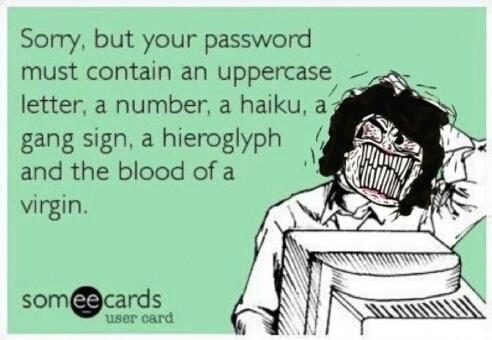Stupid passwords. Every time one thinks they have finally, finally selected an uncrackable code, it doesn't meet the website's criteria of being strong enough. Then it turns out a bunch of Eastern European hackers chewed right through it just three days later with an app.

"The Secret Life of Passwords" by Ian Urbina made me rethink the whole concept in a more loving light. The opening segment is heartbreaking in how the dead infused their passwords with their loved ones and memories.
I had come to believe that these tiny personalized codes get a bum rap. Yes, I understand why passwords are universally despised: the strains they put on our memory, the endless demand to update them, their sheer number. I hate them, too. But there is more to passwords than their annoyance. In our authorship of them, in the fact that we construct them so that we (and only we) will remember them, they take on secret lives. Many of our passwords are suffused with pathos, mischief, sometimes even poetry. Often they have rich back stories. A motivational mantra, a swipe at the boss, a hidden shrine to a lost love, an inside joke with ourselves, a defining emotional scar — these keepsake passwords, as I came to call them, are like tchotchkes of our inner lives. They derive from anything: Scripture, horoscopes, nicknames, lyrics, book passages. Like a tattoo on a private part of the body, they tend to be intimate, compact and expressive.
But after watching a Law & Order: Criminal Intent
when a murderer guessed that an e-mail password of a proud papa was "wyattsdad," mine have
been as generic as "94staples."
Urbina tells over many touching tales and how passwords are their reminders. Because of their constant use, they can stir up meaningful memories that could otherwise be forgotten.
The article continues how passwords can provide an added impetus.
For some people, these rituals are motivational. Fiona Moriarty, a competitive runner, told me that she often used “16:59” — her target time for the 5,000 meters in track. Mauricio Estrella, a designer who emailed me from Shanghai, described how his passwords function like homemade versions of popular apps like Narrato or 1 Second Everyday, which automatically provide its user with a daily reminder to pause and reflect momentarily on personal ambitions or values. To help quell his anger at his ex-wife soon after their divorce, Estrella had reset his password to “Forgive@h3r.” “It worked,” he said. Because his office computer demanded that he change his password every 30 days, he moved on to other goals: “Quit@smoking4ever” (successful); “Save4trip@thailand” (successful); “Eat2@day” (“it never worked, I’m still fat,” Estrella wrote); “Facetime2mom@sunday” (“it worked,” he said, “I’ve started talking with my mom every week now”).
Aaaaaah.
We all have our tripping points, and the only way to overcome them is with awareness. But we forget. Yet we can't forget our passwords, especially ones that we use multiple times a day.
To make our passwords secure, and to make ourselves better, find a bad behavior that must be annihilated, and alter a oft-used password to help crack that bad habit. Like "KibbudAv@Eim" or "3xDaven" or "Bnice2crzycuzn."
We've all got our weak points. Yet by infusing humanity into tech, we can remind ourselves to be "strngr" (that's "stronger").
2 comments:
Or you can just use LastPass to manage it all...until they get hacked too...
That's why I don't have an account like that! The computers are going to enslaves us all. It's just a matter of time.
Post a Comment